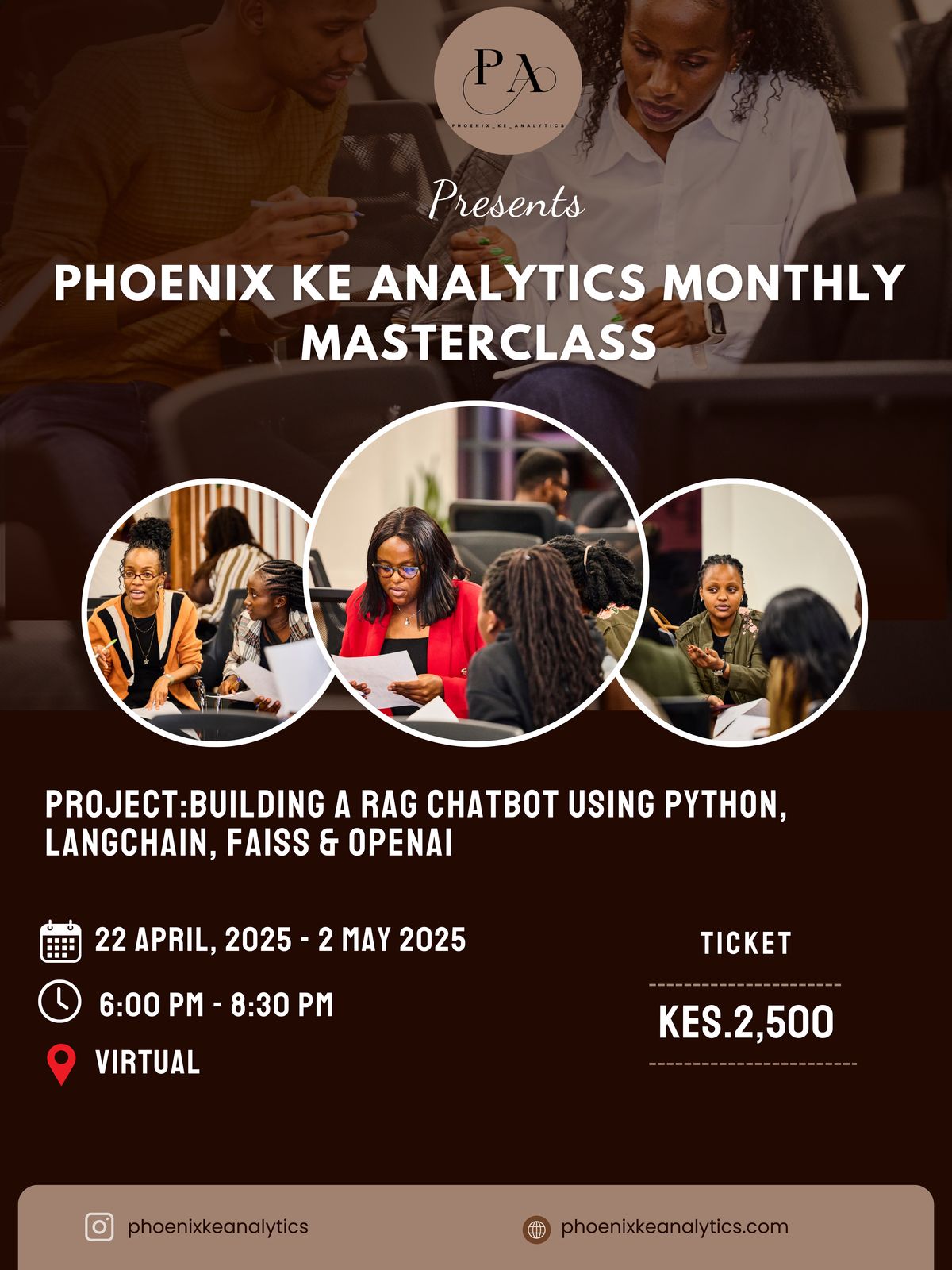Building an RAG Chatbot Using Python, LangChain, FAISS & OpenAI
Dive into a practical, expert-led masterclass designed to build your analytics and data science expertise.

About the Event
Building an RAG
Chatbot Using Python, LangChain, FAISS
& OpenAI
Prerequisites
Basic coding knowledge in any language e.g. JavaScript, PHP,
Python, Java etc.
Overview
In this era of Large Language
Models (LLMs), ensuring factual accuracy and contextual relevance in
AI-generated responses is a critical challenge. Retrieval-Augmented Generation
(RAG) bridges this gap by enhancing LLMs with real-time, domain-specific
information retrieval. This project provides a hands-on experience in building
a fully functional RAG-powered chatbot,
covering the complete pipeline—from data ingestion and vector search to
retrieval and response generation. By the end of the program, you will have gained
practical experience with embeddings,
vector search, retrieval optimization, tools, chains, agents, LangChain, FAISS,
and OpenAI.
Problem
Traditional AI chatbots rely solely on pre-trained LLMs,
often generating hallucinated or outdated responses. These models
struggle with:
- Lack
of contextual grounding – Responses are based only on pre-trained
knowledge.
- No
real-time retrieval – They can't fetch updated or domain-specific
information.
- Inability
to customize knowledge – Businesses need a way to integrate
proprietary data dynamically.
This leads to unreliable AI assistants that cannot be
trusted for business-critical use cases.
Solution
This project introduces a Retrieval-Augmented Generation
(RAG) chatbot built using Python, LangChain, FAISS, and OpenAI. Instead of relying
solely on an LLM’s pre-trained knowledge, the chatbot will dynamically retrieve relevant information from an
indexed document store before generating responses.
Project Outline
|
Day |
Date |
Objective |
Delivery |
|
Day 1 Tuesday |
22/04/2025 |
Onboarding 🔹
Course overview. 🔹
Joining Google Classroom. 🔹
Setting up our development environment. |
Live
Session - Practical |
|
Day 2 Wednesday |
23/04/2025 |
Introduction
| Understanding RAG 🔹
What is Retrieval-Augmented Generation? 🔹
Why do LLMs need retrieval? 🔹
Basic pipeline overview: index, query, retrieve and generate. 🔹
Introduction to embeddings. 🔹
FAISS vs other vector search methods |
Live
Session - Theory |
|
Day 3 Thursday |
24/04/2025 |
Assignment 🔹
Reading + quiz: RAG Fundamentals. |
Offline
(Submit |
|
Day 4 Friday |
25/04/2025 |
Setting Up
a Simple RAG App 🔹
Setting up a Python environment. 🔹
Creating an in-memory vector database. 🔹
Indexing – loading, splitting and storing documents. 🔹
Retrieval and generation |
Live
Session - Practical |
|
Day 5 Saturday |
26/04/2025 |
Assignment 🔹
Reading + quiz: index, query, retrieve and generate. |
Offline
(Submit |
|
Day 6 Monday |
28/04/2025 |
Improving
Our RAG App – Part 1 🔹
Fine-tuning retrieval quality (top-k results). 🔹
Query analysis. 🔹
Tools and chains. 🔹
Chat history. |
Live
Session – Theory and Practical |
|
Day 7 Tuesday |
29/04/2025 |
Assignment 🔹
Reading + quiz: query analysis, tools, chains and chat history. |
Offline
(Submit |
|
Day 8 Wednesday |
30/04/2025 |
Improving
Our RAG App – Part 2 🔹
Introduction to agents and decomposition. 🔹
Building an agent. |
Live
Session – Theory and Practical |
|
Day 9 Thursday |
01/05/2025 |
Assignment 🔹
Reading + quiz: agents and decomposition. |
Offline
(Submit |
|
Day 10 Friday |
02/05/2025 |
Conclusion
and Next Steps 🔹
Projects presentation. 🔹
Discussion – next steps. |
Live
Session – Theory and Practical |
Trainer
Brian Cheboi
Software Engineer – SaaS, AI, E-commerce
LinkedIn: https://www.linkedin.com/in/brian-cheboi/
About the Trainer
Brian Cheboi is a software engineer specializing in
AI-powered SaaS, e-commerce, and big data solutions. With experience in
finance, real estate, and enterprise AI, he has developed platforms that drive
business automation, intelligent decision-making, and large-scale efficiency.
Brian recently built an MVP that secured $1M in funding from a Dubai-based
accelerator. He is passionate about leveraging technology to create impactful
solutions that drive sustainable business growth.